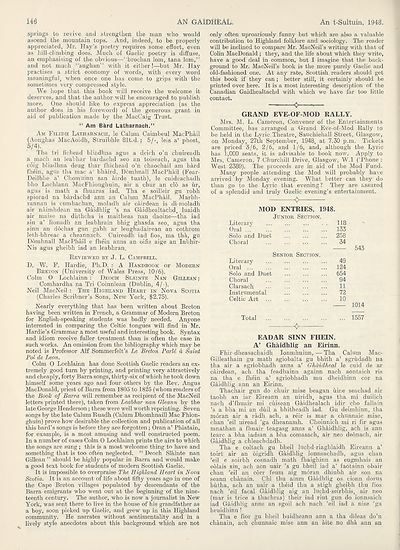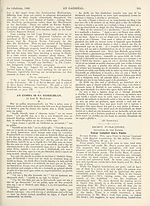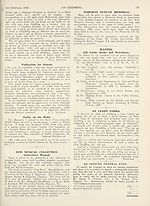An Comunn Gàidhealach Publications > Gaidheal > Volume 43, October 1947--December 1948
(154) Page 146
Download files
Complete book:
Individual page:
Thumbnail gallery: Grid view | List view

146
AN GAiDHfiAL.
springs to revive and strengthen the man who would
ascend the mountain tops. And, indeed, to be properly
appreciated, Mr. Hay’s poetry requires some effort, even
as hill-climbing does. Much of Gaelic poetry is diffuse,
an emphasising of the obvious—“brochan lorn, tana lorn,”
and not much “sughan” with it either!—but Mr. Hay
practises a strict economy of words, with every word
meaningful, when once one has come to grips with the
sometimes very compressed style.
We hope that this book will receive the welcome it
deserves, and that the author will be encouraged to publish
more. One should like to express appreciation (as the
author does in his foreword) of the generous grant in
aid of publication made by the MacCaig Trust.
“ Am Bard Latharnach.”
Am Filidh LiAthab,nach, le Calum Caimbeul MacPhail
(Aonghas MacAoidh, Struibhle 81t.d.: 5/-, leis a’ phost,
5/4>-
Tha tri fichead bliadhna agus a deich o’n chuireadh
a mach an leabhar bardachd seo an toiseach, agus tha
coig bliadhna deug thar fhichead o’n chaochail am bard
fhein, agus tha mac a’ bhaird, Domhnall MacPhail (Fear-
Deilbhe a’ Chomuinn san airde tuath), le cuideachadh
bho Lachlann MacFhionghuin, air a chur an clo as ur,
agus is math a fhuaras iad. Tha e soilleir gu robh
spiorad na bardachd ann an Calum MacPhail. Marbh-
rannan is cumhachan, moladh air cairdean is di-moladh
air naimhdean na Gaidhlig ’s na Gaidhealtachd, luaidh
air maise na duthcha is maitheas nan daoine—tha iad
sin a’ lionadh an leabhrain bhig ghasda seo, agus tha
sinn an dochas gun gabh ar leughadairean an cothrom
leth-bhreac a cheannach. Cuireadh iad fios, ma tha, gu
Domhnall MacPhail e fhein anns an oifis aige an Inbhir-
Nis agus gheibh iad an leabhran.
Reviewed by J. L. Campbell.
D. W. F. Hardie, Ph.D. : A Handbook of Modern
Breton (University of Wales Press, 10/6).
Colm 0 Lochlainn : Deoch Slainte Nan Gillean;
Comhardha na Tri Coinnlean (Dublin, 4/-).
Neil MacNeil : The Highland Heart in Nova Scotia
(Charles Scribner’s Sons, New York, $2.75).
Nearly everything that has been written about Breton
having been written in French, a Grammar of Modem Breton
for English-speaking students was badly needed. Anyone
interested in comparing the Celtic tongues will find in Mr.
Hardie’s Grammar a most useful and interesting book. Syntax
and idiom receive fuller treatment than is often the case in
such works. An omission from the bibliography which may be
noted is Professor Alf Sommerfelt’s Le Breton Parle a Saint
Pol de Leon.
Colm 0 Lochlainn has done Scottish Gaelic readers an ex¬
tremely good turn by printing, and printing very attractively
and cheaply, forty Barra songs, thirty-six of which he took down
himself some years ago and four others by the Rev. Angus
MacDonald, priest of Barra from 1805 to 1825 (whom readers of
the Book of Barra will remember as recipient of the MacNeil
letters printed there), taken from Leabhar nan Oleann by the
late George Henderson; these were well worth reprinting. Seven
songs by the late Calum Ruadh (Calum Dhomhnaill Mac Fhion-
ghuin) prove how desirable the collection and publication of all
this bard’s songs is before they are forgotten; Oran a’ Phiatain,
for example, is a most amusing and well constructed poem.
In a number of cases Colm O Lochlainn prints the airs to which
the songs are sung ; this is a most welcome thing to have and
something that is too often neglected. “ Deoch Slainte nan
Gillean ” should be highly popular in Barra and would make
a good text book for students of modern Scottish Gaelic.
It is impossible to overpraise The Highland Heart in Nova
Scotia. It is an account of life about fifty years ago in one of
the Cape Breton villages populated by descendants of the
Barra emigrants who went out at the beginning of the nine¬
teenth century. The author, who is now a journalist in New
York, was sent there to live in the house of his grandfather as
a boy, soon picked up Gaelic, and grew up in this Highland
community. He narrates without sentimentality and in a
lively style anecdotes about this background which are not
An t-Sultuin, 1948.
only often uproariously funny but which are also a valuable
contribution to Highland folklore and sociology. The reader
will be inclined to compare Mr. MacNeil’s writing with that of
Colin MacDonald ; they, and the life about which they write,
have a good deal in common, but I imagine that the back¬
ground to Mr. MacNeil’s book is the more purely Gaelic and
old-fashioned one. At any rate, Scottish readers should get
this book if they can; better still, it certainly should be
printed over here. It is a most interesting description of the
Canadian Gaidhealtachd with which we have far too little
contact.
— $
GRAND EVE-OF MOD RALLY.
Mrs. M. L. Cameron, Convener of the Entertainments
Committee, has arranged a Grand Eve-of-Mod Rally to
be held in the Lyric Theatre, Sauchiehall Street, Glasgow,
on Monday, 27th September, 1948, at 7.30 p.m. Tickets
are priced 3/6, 2/6, and 1/6, and, although the Lyric
has 1,000 seats, it is advisable to book now. Apply to
Mrs. Cameron, 7 Churchill Drive, Glasgow, W.l (’Phone :
West 2389). The proceeds are in aid of the Mod Fund.
Many people attending the Mod will probably have
arrived by Monday evening. What better can they do
than go to the Lyric that evening? They are assured
of a splendid and truly Gaelic evening’s entertainment.
$
MOD ENTRIES, 1
Junior Section.
Literary
Oral ...
Solo and Duet
Choral
Senior Section.
Literary
Oral
Solo and Duet
Choral
Clarsach
Instrumental
Celtic Art
Total
EADAR SINN FHEIN.
A’ Ghaidhlig an Eirinn.
Fhir-dheasachaidh lonmhuinn, — Tha Calum Mac-
Gilleathain gu math sgiobalta gu bhith a’ sgrudadh na
tha air a sgriobhadh anns a’ Ghaidheal le cuid de ar
cairdean, ach tha feadhainn againn nach aontaich ris
na tha e fhein a’ sgriobhadh mu dheidhinn cor na
Gaidhlig ann an Eirinn.
Thachair gun do chuir mise beagan uine seachad air
taobh an iar Eireann an uiridh, agus tha mi duilich
nach d’fhuair mi cuisean Gaidhealach idir cho fallain
’s a bha mi an duil a bhitheadh iad. Gu deimhinn, tha
moran air a radh ach, a reir is mar a chunnaic mise,
chan ’eil uiread ’ga dheanamh. Choinnich mi ri fir agus
mnathan a fhuair teagasg aims a’ Ghaidhlig, ach is ann
tearc a bha iadsan a bha comasach, air neo deonach, air
Gaidhlig a chleachdadh.
Tha e coltach gu bheil luchd-riaghlaidh Eireann a’
toirt air an oigridh Gaidhlig ionnsachadh, agus chan
’eil e soirbh cosnadh math fhaighinn as eugmhais an
eolais sin, ach aon uair ’s gu bheil iad a’ faotainn obair
chan ’eil an corr feum aig moran dhiubh air son na
seann chanain. Chi thu ainm Gaidhlig os cionn dorus
butha, ach an uair a theid thu a stigh gheibh thu fios
nach ’eil facal Gaidhlig aig an luchd-seirbhis, air neo
(mar is trice a thachras) their iad riut gun do ionnsaich
iad Gaidhlig anns an sgoil ach nach ’eil iad a nise ’ga
bruidhinn !
Tha e fior gu bheil buidheann ann a tha dileas do’n
chanain, ach chunnaic mise ann an aite no dha ann an
AN GAiDHfiAL.
springs to revive and strengthen the man who would
ascend the mountain tops. And, indeed, to be properly
appreciated, Mr. Hay’s poetry requires some effort, even
as hill-climbing does. Much of Gaelic poetry is diffuse,
an emphasising of the obvious—“brochan lorn, tana lorn,”
and not much “sughan” with it either!—but Mr. Hay
practises a strict economy of words, with every word
meaningful, when once one has come to grips with the
sometimes very compressed style.
We hope that this book will receive the welcome it
deserves, and that the author will be encouraged to publish
more. One should like to express appreciation (as the
author does in his foreword) of the generous grant in
aid of publication made by the MacCaig Trust.
“ Am Bard Latharnach.”
Am Filidh LiAthab,nach, le Calum Caimbeul MacPhail
(Aonghas MacAoidh, Struibhle 81t.d.: 5/-, leis a’ phost,
5/4>-
Tha tri fichead bliadhna agus a deich o’n chuireadh
a mach an leabhar bardachd seo an toiseach, agus tha
coig bliadhna deug thar fhichead o’n chaochail am bard
fhein, agus tha mac a’ bhaird, Domhnall MacPhail (Fear-
Deilbhe a’ Chomuinn san airde tuath), le cuideachadh
bho Lachlann MacFhionghuin, air a chur an clo as ur,
agus is math a fhuaras iad. Tha e soilleir gu robh
spiorad na bardachd ann an Calum MacPhail. Marbh-
rannan is cumhachan, moladh air cairdean is di-moladh
air naimhdean na Gaidhlig ’s na Gaidhealtachd, luaidh
air maise na duthcha is maitheas nan daoine—tha iad
sin a’ lionadh an leabhrain bhig ghasda seo, agus tha
sinn an dochas gun gabh ar leughadairean an cothrom
leth-bhreac a cheannach. Cuireadh iad fios, ma tha, gu
Domhnall MacPhail e fhein anns an oifis aige an Inbhir-
Nis agus gheibh iad an leabhran.
Reviewed by J. L. Campbell.
D. W. F. Hardie, Ph.D. : A Handbook of Modern
Breton (University of Wales Press, 10/6).
Colm 0 Lochlainn : Deoch Slainte Nan Gillean;
Comhardha na Tri Coinnlean (Dublin, 4/-).
Neil MacNeil : The Highland Heart in Nova Scotia
(Charles Scribner’s Sons, New York, $2.75).
Nearly everything that has been written about Breton
having been written in French, a Grammar of Modem Breton
for English-speaking students was badly needed. Anyone
interested in comparing the Celtic tongues will find in Mr.
Hardie’s Grammar a most useful and interesting book. Syntax
and idiom receive fuller treatment than is often the case in
such works. An omission from the bibliography which may be
noted is Professor Alf Sommerfelt’s Le Breton Parle a Saint
Pol de Leon.
Colm 0 Lochlainn has done Scottish Gaelic readers an ex¬
tremely good turn by printing, and printing very attractively
and cheaply, forty Barra songs, thirty-six of which he took down
himself some years ago and four others by the Rev. Angus
MacDonald, priest of Barra from 1805 to 1825 (whom readers of
the Book of Barra will remember as recipient of the MacNeil
letters printed there), taken from Leabhar nan Oleann by the
late George Henderson; these were well worth reprinting. Seven
songs by the late Calum Ruadh (Calum Dhomhnaill Mac Fhion-
ghuin) prove how desirable the collection and publication of all
this bard’s songs is before they are forgotten; Oran a’ Phiatain,
for example, is a most amusing and well constructed poem.
In a number of cases Colm O Lochlainn prints the airs to which
the songs are sung ; this is a most welcome thing to have and
something that is too often neglected. “ Deoch Slainte nan
Gillean ” should be highly popular in Barra and would make
a good text book for students of modern Scottish Gaelic.
It is impossible to overpraise The Highland Heart in Nova
Scotia. It is an account of life about fifty years ago in one of
the Cape Breton villages populated by descendants of the
Barra emigrants who went out at the beginning of the nine¬
teenth century. The author, who is now a journalist in New
York, was sent there to live in the house of his grandfather as
a boy, soon picked up Gaelic, and grew up in this Highland
community. He narrates without sentimentality and in a
lively style anecdotes about this background which are not
An t-Sultuin, 1948.
only often uproariously funny but which are also a valuable
contribution to Highland folklore and sociology. The reader
will be inclined to compare Mr. MacNeil’s writing with that of
Colin MacDonald ; they, and the life about which they write,
have a good deal in common, but I imagine that the back¬
ground to Mr. MacNeil’s book is the more purely Gaelic and
old-fashioned one. At any rate, Scottish readers should get
this book if they can; better still, it certainly should be
printed over here. It is a most interesting description of the
Canadian Gaidhealtachd with which we have far too little
contact.
— $
GRAND EVE-OF MOD RALLY.
Mrs. M. L. Cameron, Convener of the Entertainments
Committee, has arranged a Grand Eve-of-Mod Rally to
be held in the Lyric Theatre, Sauchiehall Street, Glasgow,
on Monday, 27th September, 1948, at 7.30 p.m. Tickets
are priced 3/6, 2/6, and 1/6, and, although the Lyric
has 1,000 seats, it is advisable to book now. Apply to
Mrs. Cameron, 7 Churchill Drive, Glasgow, W.l (’Phone :
West 2389). The proceeds are in aid of the Mod Fund.
Many people attending the Mod will probably have
arrived by Monday evening. What better can they do
than go to the Lyric that evening? They are assured
of a splendid and truly Gaelic evening’s entertainment.
$
MOD ENTRIES, 1
Junior Section.
Literary
Oral ...
Solo and Duet
Choral
Senior Section.
Literary
Oral
Solo and Duet
Choral
Clarsach
Instrumental
Celtic Art
Total
EADAR SINN FHEIN.
A’ Ghaidhlig an Eirinn.
Fhir-dheasachaidh lonmhuinn, — Tha Calum Mac-
Gilleathain gu math sgiobalta gu bhith a’ sgrudadh na
tha air a sgriobhadh anns a’ Ghaidheal le cuid de ar
cairdean, ach tha feadhainn againn nach aontaich ris
na tha e fhein a’ sgriobhadh mu dheidhinn cor na
Gaidhlig ann an Eirinn.
Thachair gun do chuir mise beagan uine seachad air
taobh an iar Eireann an uiridh, agus tha mi duilich
nach d’fhuair mi cuisean Gaidhealach idir cho fallain
’s a bha mi an duil a bhitheadh iad. Gu deimhinn, tha
moran air a radh ach, a reir is mar a chunnaic mise,
chan ’eil uiread ’ga dheanamh. Choinnich mi ri fir agus
mnathan a fhuair teagasg aims a’ Ghaidhlig, ach is ann
tearc a bha iadsan a bha comasach, air neo deonach, air
Gaidhlig a chleachdadh.
Tha e coltach gu bheil luchd-riaghlaidh Eireann a’
toirt air an oigridh Gaidhlig ionnsachadh, agus chan
’eil e soirbh cosnadh math fhaighinn as eugmhais an
eolais sin, ach aon uair ’s gu bheil iad a’ faotainn obair
chan ’eil an corr feum aig moran dhiubh air son na
seann chanain. Chi thu ainm Gaidhlig os cionn dorus
butha, ach an uair a theid thu a stigh gheibh thu fios
nach ’eil facal Gaidhlig aig an luchd-seirbhis, air neo
(mar is trice a thachras) their iad riut gun do ionnsaich
iad Gaidhlig anns an sgoil ach nach ’eil iad a nise ’ga
bruidhinn !
Tha e fior gu bheil buidheann ann a tha dileas do’n
chanain, ach chunnaic mise ann an aite no dha ann an
Set display mode to:
![]() Universal Viewer |
Universal Viewer | ![]() Mirador |
Large image | Transcription
Mirador |
Large image | Transcription
| An Comunn Gàidhealach > An Comunn Gàidhealach Publications > Gaidheal > Volume 43, October 1947--December 1948 > (154) Page 146 |
|---|
| Permanent URL | https://digital.nls.uk/125253120 |
|---|
| Description | This contains items published by An Comunn, which are not specifically Mòd-related. It includes journals, annual reports and corporate documents, policy statements, educational resources and published plays and literature. It is arranged alphabetically by title. |
|---|
| Description | A collection of over 400 items published by An Comunn Gàidhealach, the organisation which promotes Gaelic language and culture and organises the Royal National Mòd. Dating from 1891 up to the present day, the collection includes journals and newspapers, annual reports, educational materials, national Mòd programmes, published Mòd literature and music. |
|---|---|
| Additional NLS resources: |
|

